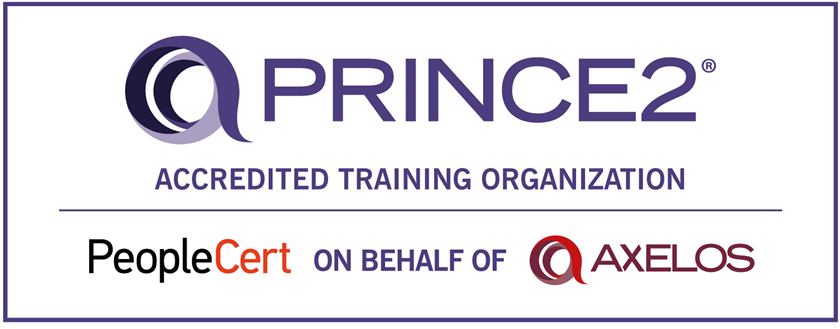

PRINCE2 is a globally recognized and established project management method that offers a structured, scalable, and tailorable approach to project management. Its focus on governance, risk management, and benefits realization sets it apart from other qualifications. By integrating agile concepts and emphasizing tailoring, the new PRINCE2 is even more adaptable to diverse project environments.
PRINCE2 7 addresses changes in the project management sector and adapts to evolving working practices and technologies.
Key Updates for Emboldening Success:
Exam: Exam Included (online exam, live procter)
Certificate: PRINCE2® 7 Foundation Certification
Prerequisites: None
Duration: 3 days
Accreditor: AXELOS & PEOPLECERT
Delivery format: online, e-Learning or classroom
Course Materials: Course Book
Delivery format: online or classroom
1.1 Recall key concepts related to project management:
a) the definition of the integrated elements of PRINCE2: principles, people, practices, processes and the project context
b) the definition of a project and project management
c) the aspects of project performance to be managed
d) the definition of delivery approaches: linear-sequential iterative-incremental, hybrid
1.2 Describe key concepts related to project management:
a) the common reasons why project management is used
b) the common challenges that PRINCE2 is designed to address
c) the characteristics of a project
d) projects in context/project environment
e) the features and benefits of PRINCE2
2.1 Understand the PRINCE2 principles:
2.2 Understand how and why the principles provide the basis of applying PRINCE2, and which factors influence the way the PRINCE2 method can be tailored and applied, who is responsible, and how tailoring decisions are documented
3.1 Key concepts related to the people element:
3.2 Understand the difference between concepts related to the people element:
3.3 Understand key concepts related to the people element:
3.4 Understand the purpose of the management products required to support the people element of projects:
3.5 Understand how people aspects integrate with other PRINCE2elements (including all subsections)
4.1 Understand the purpose of PRINCE2 management products, including:
5.1 Understand the purpose of the ‘business case’ practice
5.2 Describe the key relationships between the ‘business case’ practice and the principles
5.3 Understand the purpose of the key management products required to support the ‘business case’ practice :
5.4 Define key concepts related to the ‘business case’ practice:
5.5 Describe the guidance for effective management of the business case, including:
5.6 Describe the PRINCE2 technique for the ‘business case’ practice
6.1 Understand the purpose of the ‘organizing’ practice
6.2 Describe the key relationships between the ‘organizing’ practice and the principles
6.3 Understand the purpose of the key management products required to support the ‘organization’ practice:
6.4 Define key concepts related to the ‘organizing’ practice:
6.5 Describe the guidance for effective organizing of:
6.6 Describe the PRINCE2 technique for the ‘organizing’ practice
7.1 Understand the purpose of the ‘plans’ practice
7.2 Describe the key relationships between the ‘plans’ practice and the principles
7.3 Understand the purpose of the key management products required to support the ‘plans’ practice:
7.4 Define key concepts related to the ‘plans’ practice:
7.5 Describe the guidance for effective management of plans:
7.6 Describe the PRINCE2 technique for the ‘plans’ practice
8.1 Understand the purpose of the ‘quality’ practice
8.2 Describe the key relationships between the ‘quality’ practice and the principles
8.3 Understand the purpose of the key management products required to support the ‘quality’ practice:
8.4 Define key concepts related to the ‘quality’ practice:
8.5 Describe the guidance for effective management of quality:
8.6 Describe the PRINCE2 technique for the ‘quality’ practice
9.1 Understand the purpose of the ‘risk’ practice
9.2 Describe the key relationships between the ‘risk’ practiceand the principles
9.3 Understand the purpose of the key management products required to support the ‘risk’ practice:
9.4 Define key concepts related to the ‘risk’ practice:
9.5 Describe the guidance for effective management of risk:
9.6 Describe the PRINCE2 technique for the ‘risk’ practice
10.1 Understand the purpose of the ‘issues’ practice
10.2 Describe the key relationships between the ‘issues’ practice and the principles
10.3 Understand the purpose of the key management products required to support the ‘issues’ practice:
10.4 Define key concepts related to the ‘issues’ practice:
10.5 Describe the guidance for effective management of issues:
10.6 Describe the PRINCE2 technique for the ‘issues’ practice
11.1 Understand the purpose of the ‘progress’ practice
11.2 Describe the key relationships between the ‘progress’ practice and the principles
11.3 Understand the purpose of the key management products required to support the ‘progress’ practice:
11.4 Define key concepts related to the ‘progress’ practice:
11.5 Describe the guidance for effective management of progress:
11.6 Describe the PRINCE2 technique for the ‘progress’ practice
Understand the objectives of the process
Understand the context of the Process
Understand the objectives of the process
Understand the context of the Process
Understand the objectives of the process
Understand the context of the Process
Understand the objectives of the process
Understand the context of the Process
Understand the objectives of the process
Understand the context of the Process
Understand the objectives of the process
Understand the context of the Process
Understand the objectives of the process
Understand the context of the Process